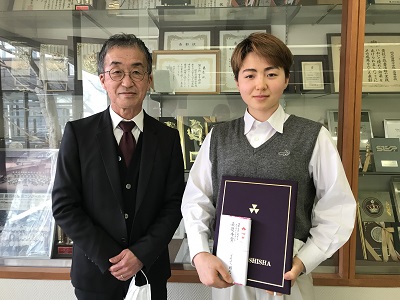|
国際交流に関するエッセイコンテストは,同志社国際主義教育委員会が国際交流プログラムの一環として,国際交流に関するエッセイを同志社各学校の学生・生徒から募り,国際交流や国際問題に関する考えを発表する機会として実施している。
第26回目となる今年度のテーマは,「『新時代に向けた進化する国際交流』
"New International Exchange for a New Era"」, であり,日本語部門4点(高校生の部3点,中学生の部1点),英語部門9点(大学生の部1点,高校生の部4点,中学生の部4点)の作品応募があった。審査委員会の厳正な審査により受賞者を決定し,日本語部門,英語部門それぞれの最優秀賞,優秀賞,佳作の受賞者に対して,表彰状及び副賞が授与された。なお,今年度については,新型コロナウイルス感染症急拡大の状況に鑑み,表彰式は中止し,各学校での授与となった。
なお,日本語部門について新 茂之委員から,英語部門についてAnya Benson委員からそれぞれ以下のとおり講評があった。
(日本語部門)
今年度のテーマは、「新時代に向けた進化する国際交流」でした。新型コロナウイルス感染の拡大は、物理的に海外に渡航して対面で人と接する機会をわたくしたちから大きく奪っていきました。他方で、コロナ禍にあっても、最新の技術によって、わたくしたちは、遠く離れた人とも対話できるようになりました。このような状況のなかで、国際交流をどう進化させていくのか、今回のエッセイコンテストではそれをみなさんに問いました。
優秀賞を受賞した作品は、コロナ禍という負の環境こそ、これまでわたくしたちが当然視してきた国際交流に新たな照明を投げ掛けているのである、という事実をみごとに描き出しています。ビデオブックをYouTubeで配信していろいろな形でさまざまな人たちと交流を実現させていくという試みは、パウロが「ローマ人への手紙」のなかではっきりと述べているように、艱難が希望を生み出すことの証左である、と言っても過言ではないでしょう。本作品は、直接的な交流を待ち望みつつも一歩でも前進していこうとする姿を力強く表現しています。
佳作の作品も、現況をどのように克服していくのか、自らの体験と活動に照らして、その方途をそれぞれに明らかにしようとしています。海外の大学が提供している企画に参加し苦労を重ねながらの成長。対面型と非対面型の国際交流を比較しつつ人間的交流の本質に迫ろうとしている考察。国際交流のなかで日本の漫画が果たす役割を見つめるための視点。どの作品も、独自の観点からこれからの国際交流を見定めようとしています。
新型コロナウイルス感染の終息をまだまだ見通せないなかにあっても、経済的にも政治的にも国際交流を停止できません。同志社は、創立者新島襄が米国で学んで日本の教育のあり方を変革したように、国際主義を教育の柱の一つとして掲げています。国際交流は、同志社に集うみなさんの成長の糧であります。将来を担うみなさんには、ぜひとも、国際交流の今後を、同志社での学びを通じて、展望してほしい、と切に願っております。
(英語部門)
In this era of rigidly maintained distances, international exchange is a difficult topic to discuss. On one level, an increasingly digital world has made exchange more possible than ever. At the same time, opportunities to speak to people from different backgrounds whilst in the same space, surrounded by the same scenery, have become rare. What does international exchange mean in today’s world, and how can we make the best of it?
Many of the essay writers turned to technology to answer these questions. The contest participants discussed how aspects of our lives today, such as remote work and travel restrictions, may not be permanent but will likely embed themselves in our cultures in some form. The essays imagined what form that might be, providing visions of a future in which innovation enables meaningful exchange. At the same time, many of the participants showed that such hopeful visions cannot be taken for granted. They are not inevitable, but possibilities we must aim to realize.
It was this sense of responsibility and reflection that struck me as I read the essays written by this year's contest participants. They showed a deep-set belief that technology can be used productively to make a better world ? but also acute awareness that a better world needs to be made. The essays spoke of inequalities, dangers, and above all, the need to actively make something good from the complex realities we face.
But it is not only technology that the participants spoke of as a potential and a responsibility. The essays also referred to the importance of language learning and the connections it fosters. Such connection is ultimately about human communities. Whatever apps we may or may not use, bonds between people remain the core of exchange. The tensions within and across communities, the challenges of expression, and the need to develop greater awareness: these are all ancient problems, refashioned but not fundamentally changed in this new era. The contest participants could see that, and I hope all the participants will continue striving for such exchange.
|
|

